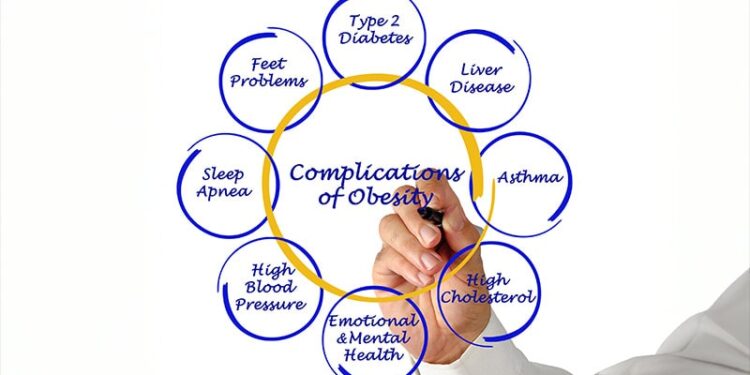Obesity was “strongly” associated with 16 major health conditions, with an increasing prevalence across body mass index (BMI) categories in most cases, a new longitudinal cohort study revealed.
“The prevalence of class III obesity surprised me,” Michael Blaha, MD, of the Johns Hopkins Ciccarone Center for Prevention of Cardiovascular Disease in Baltimore, told Medscape Medical News. “It is really humbling to see how many people in the USA have a BMI > 40, particularly among certain race/ethnic groups.”
The study showed that class III obesity was most strongly associated with obstructive sleep apnea (OSA), type 2 diabetes (T2D), and metabolic dysfunction–associated steatotic liver disease (MASLD).
“We probably have underestimated the effects of obesity because we tend to study its effects one outcome at a time,” Blaha said. “By studying 16 important and expensive chronic health outcomes at the same time, we highlight how widespread the impact of the modern obesity epidemic really is.”
The study was published online in NEJM Evidence.
A ‘Dominant Feature’ of US Health Outcomes
The researchers analyzed data from 270,657 participants enrolled in the All of Us Research Program who had linked electronic health records and a BMI ≥ 18.5. The mean age was 52; 62% of participants were women, and 22% of participants were Black.
Obesity was defined as a BMI > 30. Class I obesity was observed in 21.2% of participants, class II in 11.3%, and class III in 9.8%.
In contrast to participants with normal weight, people with obesity were more likely to be women, Black, have a lower level of education and income, and have higher blood pressure and a higher waist-to-hip ratio.
“We picked 16 outcomes ahead of time that we thought may be related to obesity in a graded fashion, based on literature review, expert opinion, and clinical experience,” Blaha said. These included the prevalence of hypertension, T2D, hyperlipidemia/dyslipidemia, heart failure, atrial fibrillation, atherosclerotic cardiovascular disease (ASCVD), chronic kidney disease, pulmonary embolism, deep vein thrombosis, gout, MASLD, biliary calculus, OSA, asthma, gastroesophageal reflux disease, and osteoarthritis.
The median follow-up time was about 3 years.
Among the total study population, hypertension was the most prevalent health outcome at 35.3%. For all the included health outcomes, there was an increasing prevalence across BMI categories, with the normal weight population being the lowest and class III obesity the highest, except for ASCVD, for which the highest prevalence occurred with class II obesity. Associations were consistent across sex and race.
Obesity was strongly associated with all incident outcomes. Class III obesity was most strongly associated with OSA (hazard ratio [HR], 10.94), T2D (HR, 7.74), and MASLD (HR, 6.72). Associations were weaker for asthma (HR, 2.14), osteoarthritis (HR, 2.06), and ASCVD (HR, 1.96).
“These findings from a modern nationwide longitudinal cohort study suggest that obesity is a dominant feature of many health outcomes in the United States, with the growing population of class III obesity associated with the highest burden,” the authors wrote.
‘Public Health Crisis’
Jaime Almandoz, MD, associate professor of internal medicine at UT Southwestern Medical Center in Dallas, commented on the study for Medscape Medical News.
Although the study relies primarily on BMI, a measure that does not fully capture the complexity of obesity-related health risks, and the use of observational data introduces potential biases, “the study clearly highlights the major health consequences associated with obesity, particularly class III,” he said. “The findings underscore that obesity is a public health crisis driving serious health complications and requires a coordinated response across specialties and healthcare systems.”
Although most of the findings align with prior evidence, “the strong associations with class III obesity are striking — particularly the nearly 11-fold increased risk of OSA,” he noted.
“The comparatively weaker link between obesity and cardiovascular disease, relative to diabetes or sleep apnea, likely reflects the effectiveness of current treatments and underscores the complexity of obesity’s impact on different health conditions,” he added.
“Given the high prevalence of obesity, it is essential to create and integrate structured obesity care across primary care and subspecialities,” he said. “Immediate steps should include enhanced clinician education about evidence-based obesity management, referral pathways to comprehensive obesity or cardiometabolic programs, and more equitable access to highly effective obesity medications and surgery.”
Blaha’s disclosures are available online with the article. Almandoz reported fees from advisory board memberships and consulting for AbbVie, Boehringer Ingelheim, Eli Lilly and Company, Nestlé, Novo Nordisk, and Wave Life Sciences.
Marilynn Larkin, MA, is an award-winning medical writer and editor whose work has appeared in numerous publications, including Medscape Medical News and its sister publication MDedge, The Lancet (where she was a contributing editor), and Reuters Health.
Source link : https://www.medscape.com/viewarticle/obesity-strongly-linked-16-cardiometabolic-diseases-2025a10007wf?src=rss
Author :
Publish date : 2025-04-02 11:30:00
Copyright for syndicated content belongs to the linked Source.














